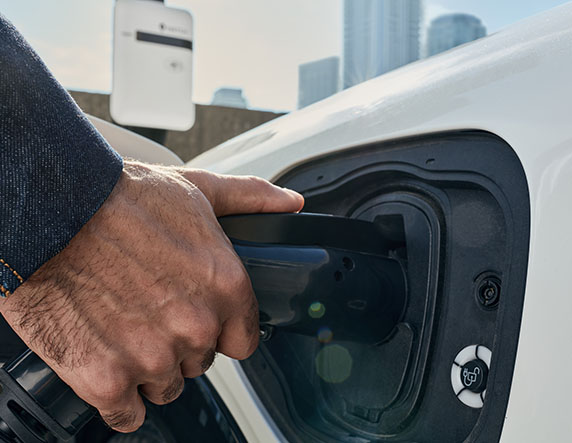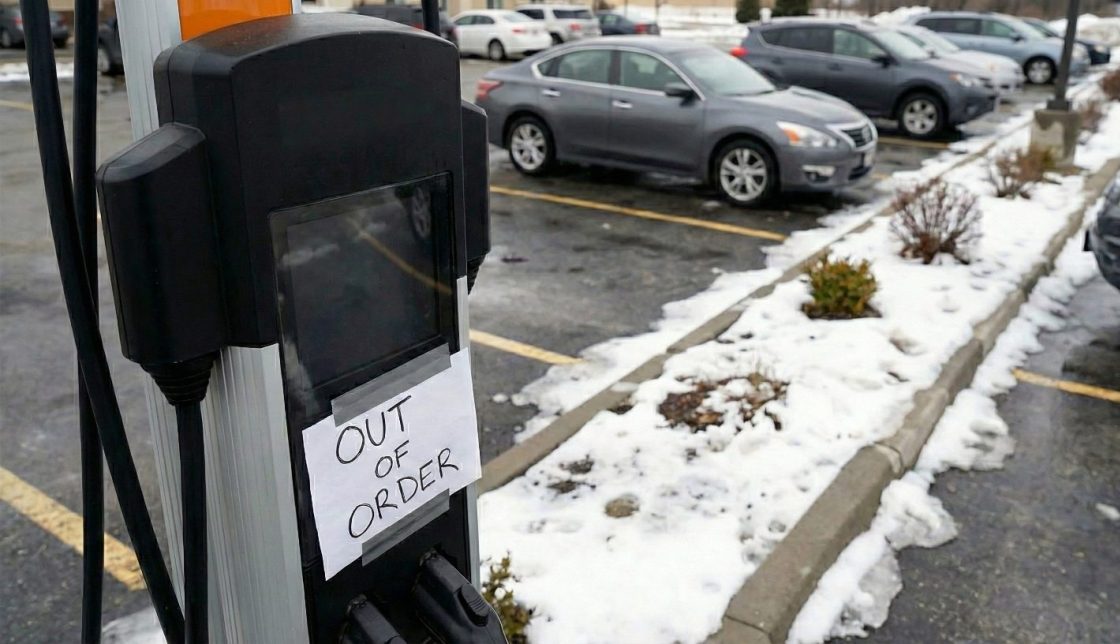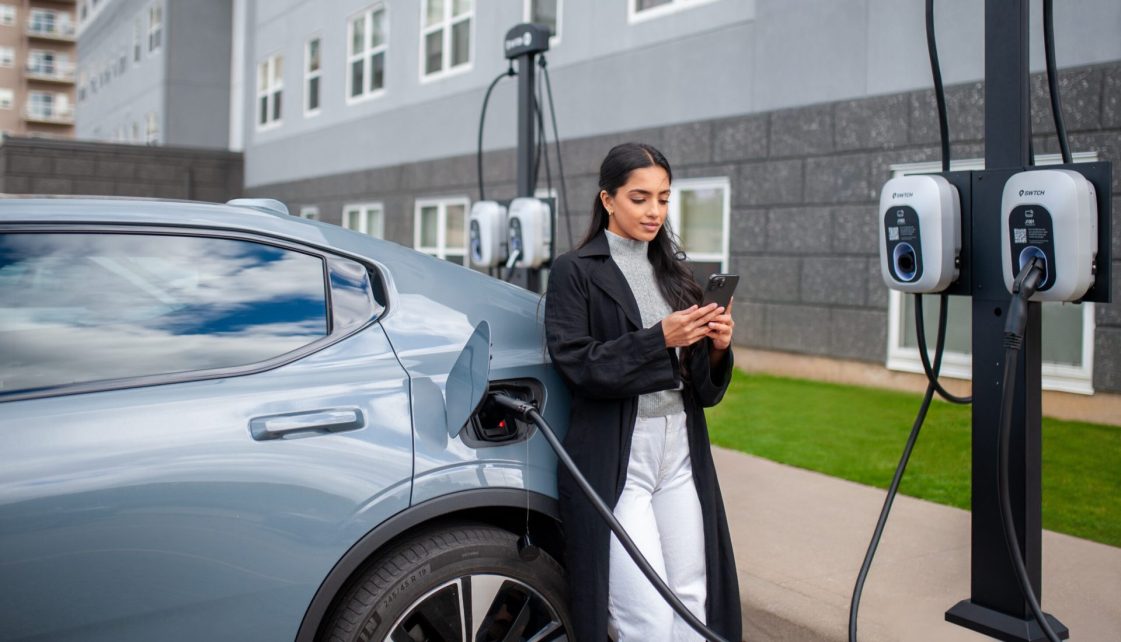Why California Schools Should Install EV Charging—And How SWTCH and FoundationCCC Make It Easy
As electric vehicles (EVs) become more and more popular, public institutions across California will become important hubs for charging these vehicles. Students, staff, and faculty will want to charge up in the places they spend large parts of their day, and schools that meet this need will reap the rewards from recruitment and community satisfaction perspectives.
Thanks to a new partnership between SWTCH and the Foundation for California Community Colleges (FoundationCCC), schools now have a streamlined and cost-effective way to get ahead of the pack and start installing EV charging stations.
Want to future-proof your school and attract eco-conscious students and staff? Keep reading to discover why EV charging offers a key advantage for California schools—and how SWTCH and FoundationCCC make it easier than ever to get chargers installed.
Why EV Charging is a strategic advantage for California schools
Meeting high demand for EV charging in California
The demand for EV charging is growing fast. There are more EVs on the roads than ever before, and yet the number of available charging stations is not keeping pace. In California, which leads the nation in EV adoption, there’s a particularly strong need for more chargers to be installed as soon as possible. As of 2035, the state will only allow the sale of vehicles with zero tailpipe emissions.
Public educational institutions are key environments in which these charging stations will be placed. Not only do they serve huge communities of people, but those communities are also the likeliest to be interested in owning EVs.
- Over two-thirds of Gen Z (most college-age students today) have considered purchasing an EV.
- Faculty and staff are also likely to have strong interest, with nearly half of college-educated adults exploring EV ownership.
Workplace charging is in ever-higher demand. Multifamily properties like apartment buildings, where many students live, are behind the curve in delivering EV charging for their residents.
By installing EV charging, your school can meet a very real need, thereby gaining a powerful asset in recruitment efforts for students and staff alike.
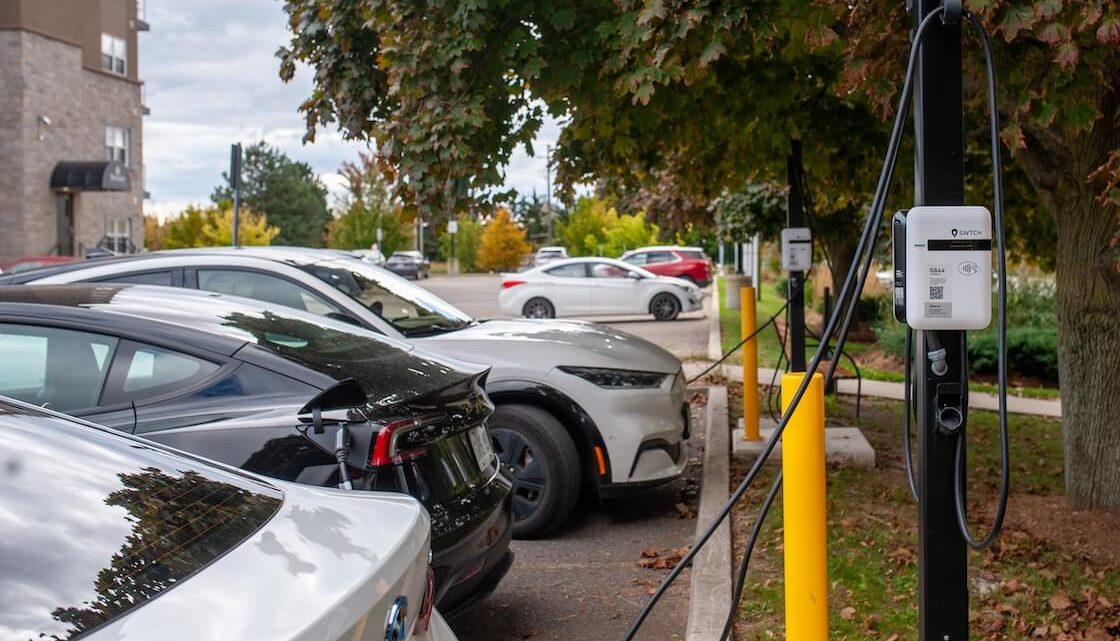
Delivering tangible proof of your commitment to sustainability
Installing EV charging infrastructure doesn’t just meet practical needs—it positions schools as leaders in sustainability.
EV charging directly supports California’s carbon-reduction targets. For schools, installing chargers demonstrates a tangible commitment to environmental stewardship.
And the contribution of EV charging stations is measurable. Platforms like SWTCH make it easy for schools to see how many CO2e emissions have been averted thanks to the charging sessions completed on their campuses. For schools aiming to achieve carbon neutrality or enhance their sustainability initiatives, this is a clear win with great, measurable impact.
The FoundationCCC and SWTCH Partnership: EV charging made simpler, faster, and less expensive
With such a pressing need for EV charging stations across California, the FoundationCCC decided to expedite the process of evaluating EV charging providers by selecting a few partners, like SWTCH, as pre-approved vendors.
Now, California schools can procure SWTCH’s EV charging solutions through the CollegeBuys, SchoolBuys, and CivicBuys programs. This allows you to skip lengthy RFPs and secure preferred pricing, all with the knowledge that the solutions on offer meet the highest standards for quality and reliability.
What This Partnership Offers
- Simplified Procurement: The partnership eliminates bureaucratic hurdles by adhering to California’s Public Contract Code (PCC). Schools can adopt SWTCH EV chargers without navigating a traditional, time-intensive RFP process.
- Cost Efficiency: Preferred pricing ensures that schools can implement charging infrastructure at the best possible rates, making projects accessible even to institutions with tight budgets.
- Tailored Solutions: SWTCH provides EV charging systems that adapt to your school’s specific needs, offering scalability, advanced energy management, and flexible user access.
Altogether, the partnership provides the smoothest, fastest path toward adopting EV charging stations for your campus without risk of substandard performance once your charging stations are installed.
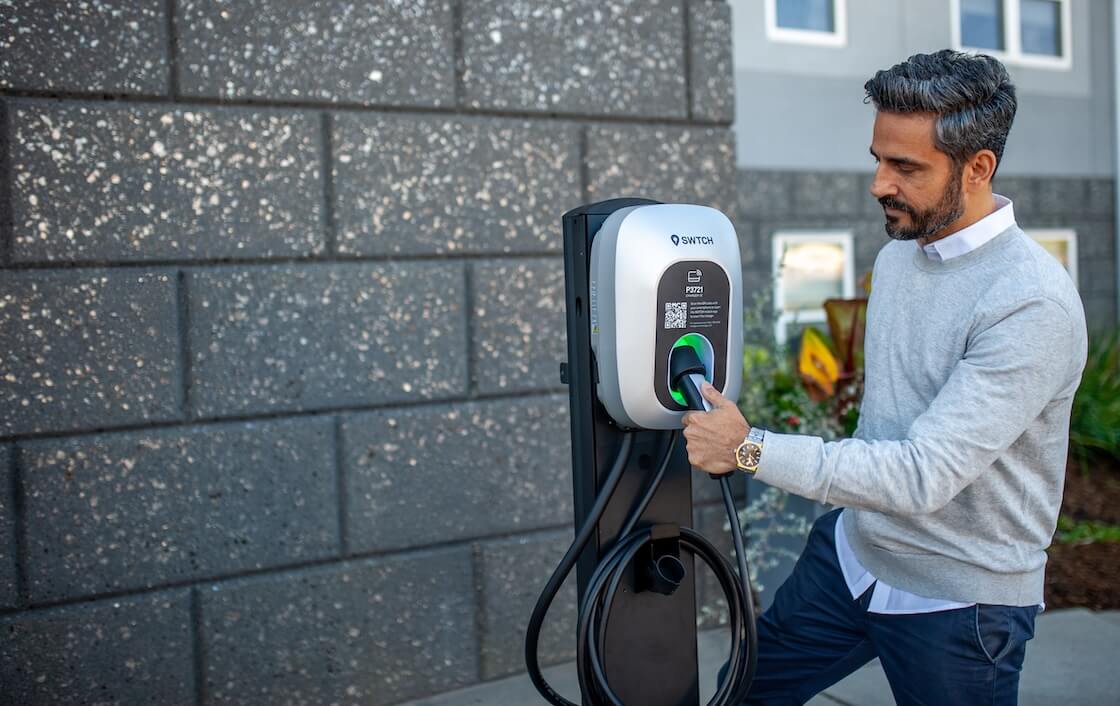
Funding programs to further drive down the cost of campus EV charging
There are some incredible rebate and incentive programs out there to help with the costs of purchasing and installing EV charging stations. By taking advantage, you can save tens or hundreds of thousands of dollars on electrical upgrades, charging station hardware, and even maintenance costs, depending on which programs you are selected for.
Here are a few of the most significant programs out there that you should consider applying to.
Communities in Charge: $6,500 or 100% of eligible costs
Funded by the California Energy Commission’s Clean Transportation program, “Communities in Charge” aims to accelerate the deployment of Level 2 charging stations in California, making EV ownership more accessible for people across the state.
With “Community Connections,” or places where people live and gather, gaining favorable consideration under this program, schools are particularly well-positioned to secure funding through this program.
Read more about the program here, or reach out to our team for support in applying.
SCE Charge Ready: Variable funding for Level 2 chargers and installation
The Charge Ready program from Southern California Edison (SCE) offers a number of different ways to fund the purchase and installation of EV charging stations for your property.
Specific amounts covered by the program are variable, but they’re aimed at supporting the installation of several charging stations at a time, making the program a likely fit for your institution’s aims.
Read more about the program here, or reach out to our team for support in applying.
PCE EV Ready incentives: Up to $90,000 or 75% of project costs
Peninsula Clean Energy offers a number of incentive programs aimed at helping different kinds of properties install EV charging for different purposes. Funding amounts vary based on whether a property is new or existing and whether chargers are available just for employees, for the public, for residents, etc.
Read more about the program here, or reach out to our team for support in applying.
Alternative Fuel Vehicle Refueling Property (§ 30C) Federal Tax Credit: $100,000 or 30% of the cost of the project
The 30C tax credit program is available only to properties in low-income or non-urban areas, but for those schools that are eligible, it has a lot of value to offer.
Provided all requirements are followed in terms of wages and apprenticeship standards, a property can receive up to $100,000 or 30% of a project’s cost in funding.
This is a program that the team at SWTCH is particularly adept at securing funding through. For more information, please review our guide to this program, or reach out to our team. We’ll be happy to help you submit a successful application, and can even provide accelerated funding to you.
How SWTCH helps schools succeed with EV charging
It’s not enough to adopt an EV charging solution for your school—it has to be one that will support you and your community and deliver a truly great charging experience.
With some EV charging companies, you get a one-size-fits-all approach to EV charging and little support to manage it once installation is complete. With SWTCH, you gain a partner dedicated not only to helping you build a customized solution for your campus, but also to supporting you over the long haul in maintaining, growing, and optimizing your charging infrastructure.
Here are some of the most important ways we support schools with EV charging.
Easy user management to make sure chargers are used the way you want
Want to restrict access to some or all of your chargers? SWTCH makes it easy to define who can charge up, with customized access control that lets you grant and revoke access to charging privileges as needed.
And, with charging sessions triggerable both via smartphone app and RFID card, you can ensure your community is always able to charge up, even in environments where your local network doesn’t reliably reach (such as some parking garages).
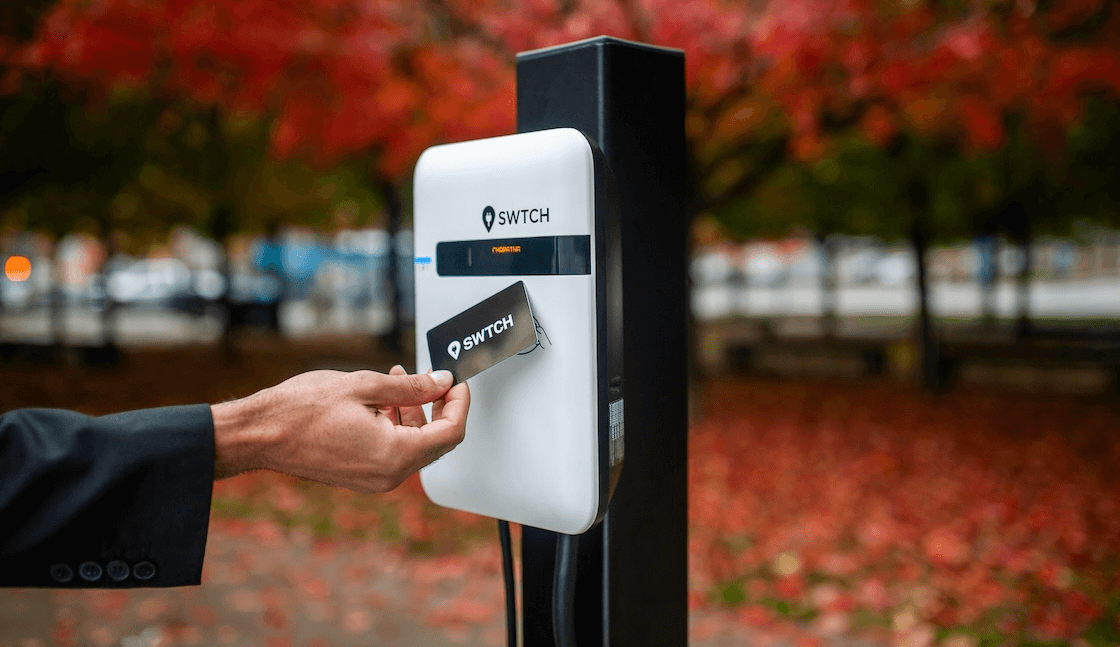
Intelligent energy management technology to optimize your energy usage
By default, an EV charging station requires a dedicated circuit on which to operate, and can’t adjust energy consumption based on external factors. This means extremely high costs for electrical upgrades when installing large numbers of EV charging stations, and little-to-no control over their energy consumption in situations where your property is already consuming a lot of energy—a hot day, for example, when your air conditioning is running nonstop.
With SWTCH, you gain an intelligent energy management technology that allows up to 20 chargers to operate on a single circuit, helping to reduce or eliminate costly electrical upgrades while still letting you meet growing demand.
And when your chargers are in use, they’ll reduce the amount of power they deliver when your property’s overall energy consumption is high. This lets you meet your community’s need for EV charging services without incurring excess demand costs.
Robust reporting to help you meet your EV charging goals
You’ll find the most success with your EV charging stations if you set goals for usage, revenue generation, CO2e emissions reductions, etc. With SWTCH, you get easy access to dashboards that helps you stay on top of all the data you need to understand how well your charging stations are performing against the goals that matter most to you.
And since you can easily export detailed reporting on your charging stations, you’ll be able to share your successes with your team, your board, your student community, or anyone else you like.
Flexible financial models to grant additional options for adopting charging
Though the typical arrangement for EV charging involves capital expenditures for chargers, electrical upgrades, and installation, this kind of deal doesn’t work for everyone. With SWTCH, schools also have the option to choose a charging-as-a-Service (CaaS) payment model instead.
With charging-as-a-sercice from SWTCH, there are no upfront costs. Instead, the lifetime costs of your chargers are divided into monthly payments to be paid over the course of a few years (typically five).
This approach can make installing EV chargers even easier to manage while still allowing you to benefit from the exact same funding programs available for an outright purchase.
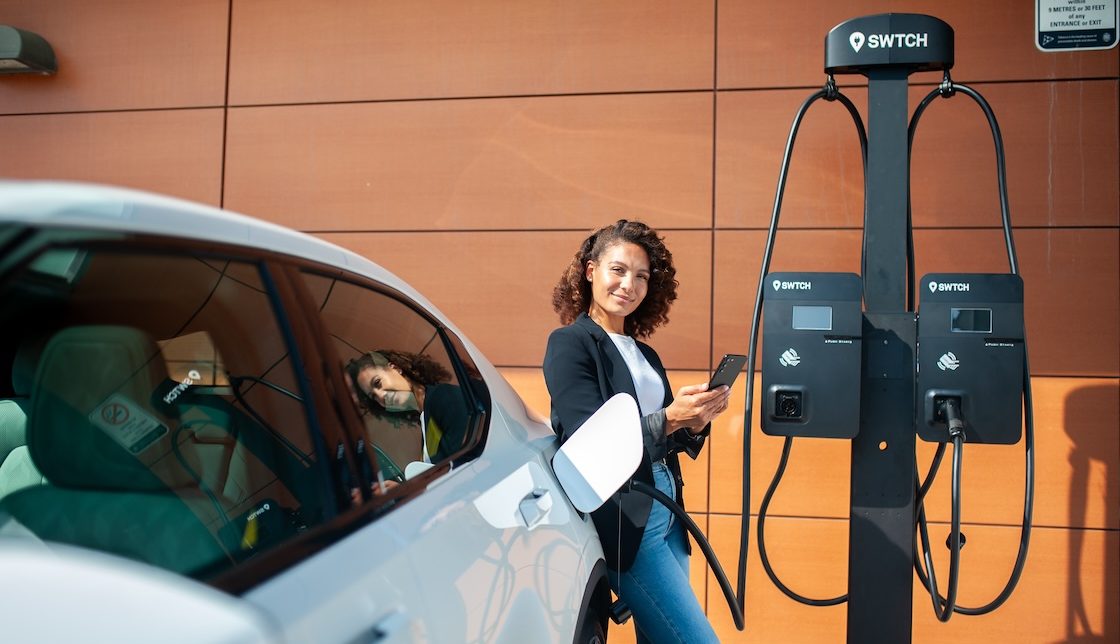
Hands-on support to help you succeed with EV charging every step of the way
One of the biggest problems in EV charging is that solutions providers stop picking up the phone once a purchase has been made. With SWTCH, you—and the folks who use your charging stations—are guaranteed the support you need whenever you need it.
From site assessments to assistance navigating funding programs, from day-to-day driver assistance with charging to help with analyzing charger performance and revenue generation, SWTCH is there to help your school and your EV drivers with whatever needs arise.
And with our deep experience supporting colleges, technical schools, and other educational institutions across North America, you can be sure that we’re well-acquainted with the most common challenges faced by institutions like yours. We’ve got the solutions necessary to help you achieve your EV charging goals smoothly and successfully, ensuring your campus is ready to meet the evolving mobility needs of your school community.
Take the first step toward making your campus a leader in clean mobility.
Contact SWTCH today or visit our CollegeBuys profile to learn more.

